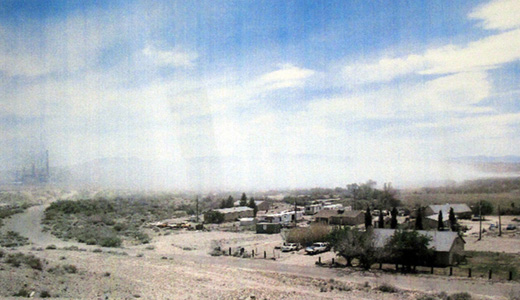
For years, the NV Energy-owned Reid Gardner coal plant just outside of Las Vegas, Nevada has been poisoning the Moapa tribe of Paiute Native Americans. Coal ash is dumped in landfills and the plant’s particulate output – which includes lead, mercury, and arsenic – contributes to global warming. After filing an open records request, the Paiutes learned that NV Energy has been falsifying its pollution output reports since at least 2006.
Year after year, particulate data was just cut from previous reports by the company, and pasted into “new” ones, which have been exposed now only by the scrutiny of the Paiutes, who have been at the receiving end of the pollution as it went unreported for over seven years. The tribe also discovered that the company routinely exceeded its “heat input” permit limits at the plant, which also caused pollution emissions to increase.
Perhaps more disturbing is that the Nevada Division of Environmental Protection (NDEP) learned of these transgressions last year, but did nothing more than write the incidents off as products of “human error” and let NV Energy off with a warning. There was neither a penalty nor a fine. Meanwhile, the NDEP did not see fit to tell the Paiutes about the falsified data at the time.
Now, after their own digging has revealed the truth, the Paiutes are filing a lawsuit against NV Energy and fighting to have the Reid Gardner plant shut down once and for all. In fact, doing just that would have significant economic benefits – in addition to the obvious health improvement – according to the Sierra Club of Nevada.
This is not the first time the Native Americans have come to blows with the energy company, which is the product of a merger between the Nevada Power Company and the Sierra Pacific Power Company. In fact, the Paiutes have often voiced their opinion that the Reid Gardner plant ought to be dismissed in exchange for renewable energy projects. There has been some progress on that front: The Los Angeles Department of Water and Power agreed in October 2012 to purchase the power produced by the 250-megawatt Moapa Solar Energy Center that is being built on the Paiute reservation, and which has the tribe’s approval. However, the Paiutes’ hopes that the facility will lead to the shutdown of Reid Gardner have, so far, come to no avail.
Others, too, have spoken out against NV Energy’s toxin-spewing facility. In August 2012 at the National Clean Energy Summit in Las Vegas, Sen. Harry Reid, D-Nev., called for the plant’s closure, remarking that it was a “dirty relic” responsible for “immense environmental pressures and chronic illnesses.”
“The soot,” he said, “and the dangerous chemicals [within] it, is literally killing the Paiutes. It’s no secret that coal plants kill. Each year more than 24,000 deaths are attributed to coal-fired power plant emissions in the United States alone.”
It’s true; there is a disproportionately high rate of respiratory illnesses amongst the Paiutes, according to Indian Country Today. Paiute tribal chairman William Anderson said, “Every home has someone using a breathing apparatus or inhaler. We see frequent deaths – the most recent being someone in the home closest to the plant.”
Tribal member Calvin Meyers said that the pollution was negatively affecting the lifestyle of his people. “I cannot practice my religion anymore, I cannot eat my natural foods that we gather, I cannot use the skins anymore of the rabbits that we use for clothing, I cannot use the willows for housing…they are all contaminated. It’s not just the will of the Paiutes to stop [a coal plant]. It’s our will that we survive.”
“They don’t care about us,” Anderson concluded. “They think we’re nothing, but our people and our culture were here long before they were.”
Photo: A cloud of coal ash blows over the Moapa River Indian reservation in Nevada. On the left, the coal plant itself can be seen in the distance. KCET.org/Moapa Band of Paiutes

MOST POPULAR TODAY


Zionist organizations leading campaign to stop ceasefire resolutions in D.C. area

Communist Karol Cariola elected president of Chile’s legislature

Afghanistan’s socialist years: The promising future killed off by U.S. imperialism

High Court essentially bans demonstrations, freedom of assembly in Deep South






Comments